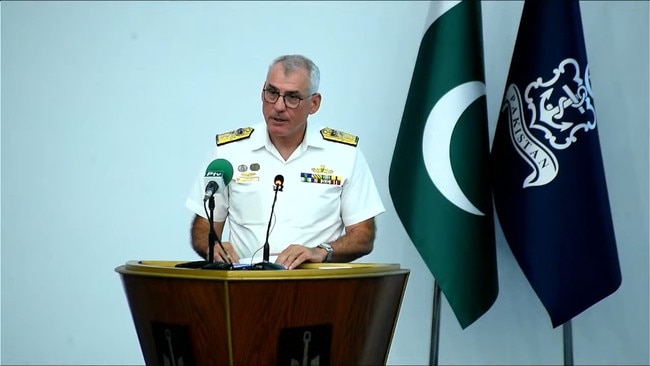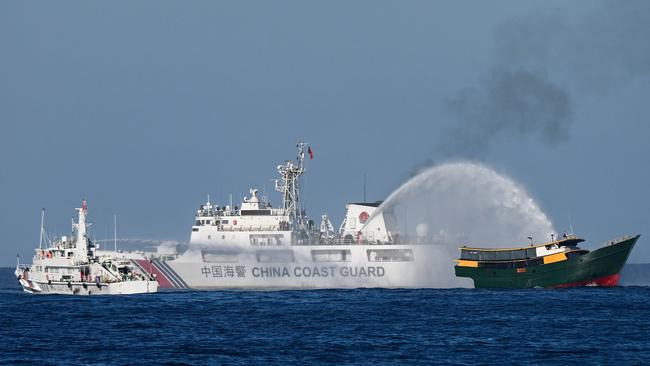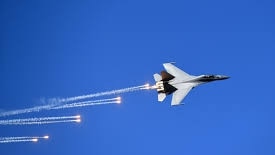China condemned over ‘disorderly’ conduct at sea
One of Australia’s top naval officers has called out Beijing’s aggressive conduct in the South China Sea and the severing of undersea cables by Chinese vessels.

One of Australia’s most senior naval officers has called out Beijing’s aggressive conduct in the South China Sea and the severing of undersea cables by Chinese vessels as threats to maritime safety as well as the international economy.
Australian Fleet Commander Christopher Smith condemned countries that paid lip service to international law while actively undermining it, in a pointed speech to a major naval conference just a day before a Chinese fighter jet shot flares in front of an Australian surveillance aircraft.
Rear Admiral Smith suggested China was deliberately violating international law by using its coastguard and shadowy maritime militia to harass other nations’ vessels, and expressed disbelief that damage to seabed cables attributed to Chinese ships was accidental.
He told the AMAN Dialogue in Pakistan last Monday that maintaining good order at sea was key to the economic prosperity of many nations, but some countries were making a “conscious choice” to disrupt it. “Good order at sea is not speaking of harmonious seas, while militias and coast guards escalate tensions with the use of water cannons and ramming of vessels,” Rear Admiral Smith said.
“Good order at sea is not claiming to support the rules-based order while seeking to impose an interpretation of the world inconsistent with the international ruling. Yet this is what we are observing in the South China Sea.
“Just as we cannot ignore or wish away an approaching typhoon or hurricane, we cannot ignore or wish away what is before our eyes.”
His comments, to an audience from at least 60 nations including China, follow a series of dangerous South China Sea clashes between Chinese ships and those operated by The Philippines near the Spratly Islands’ Second Thomas Shoal.
Rear Admiral Smith said the dragging of anchors over communications cables was also undermining good order at sea and disrupting the global economy.
A Chinese ship, the Yi Peng 3, has been blamed for severing two data cables with its anchor in Swedish waters last November, while another, the Shunxing 39, is suspected of damaging a cable with its anchor northeast of Taiwan in January.
Rear Admiral Smith said: “As a professional mariner, I find it hard to believe that so many anchors could be so suddenly poorly secured, for such extended periods of time.”

He also called out Yemen’s Houthi rebels, and their Iranian sponsors, for their attacks on international shipping, and Russia for its failure to secure floating mines in the Black Sea that posed a threat to regional shipping.
Rear Admiral Smith said the UN Convention on the Law of the Sea – to which China is a signatory – was the foundation of good order at sea, and that countries’ adherence to such treaties offered “an insight into their sovereign identity and the way they value the sovereign identity of other nations”.
A 2016 UNCLOS ruling declared Beijing’s claims over the South China Sea, including the Spratly Islands, were invalid.
China was a leading participant at this year’s AMAN 2025 naval exercise, held alongside the AMAN Dialogue, sending its Type 052D guided-missile destroyer, Baotou, and Type 903A replenishment ship, Gaoyouhu.
Australia has ramped up its freedom of navigation missions in the South China Sea in recent times with the US, Japan and The Philippines, infuriating Beijing, which claims ownership over almost all of the waterway.
Australian military aircraft also conduct routine operations over the South China Sea, where they have faced a series of near-misses caused by Chinese fighter jets.
In the most recent incident last week, a Chinese J-16 fighter fired flares within 30m of an RAAF P-8A Poseidon in an “unsafe and unprofessional manoeuvre”.

The Australian government said the P-8 was in international airspace and lodged an official protest with Beijing, arguing the Chinese jet had risked the lives of up to a dozen RAAF aviators.
But Beijing claimed the Australian aircraft “deliberately intruded into China’s airspace”, and it took “legitimate, lawful, professional and restrained measures to expel the airplane”.
“China has lodged serious protests with Australia and urged it to stop infringing on China’s sovereignty and making provocations and stop disrupting peace and stability in the South China Sea,” Chinese foreign ministry spokesman Guo Jiakun said.
The close call over the South China Sea followed a similar one in May last year, when a Chinese fighter jet detonated flares near an Australian navy helicopter operating in international waters near South Korea.
About six months earlier, Australian navy divers sustained minor injuries when a Chinese warship triggered its sonar while they were in the water freeing a fishing net from the propeller of HMAS Toowoomba.
In another incident, in 2022, a Chinese fighter jet released aluminium chaff countermeasures in front of an Australian P-8, fragments of which were sucked into the Australian aircraft’s engine.



